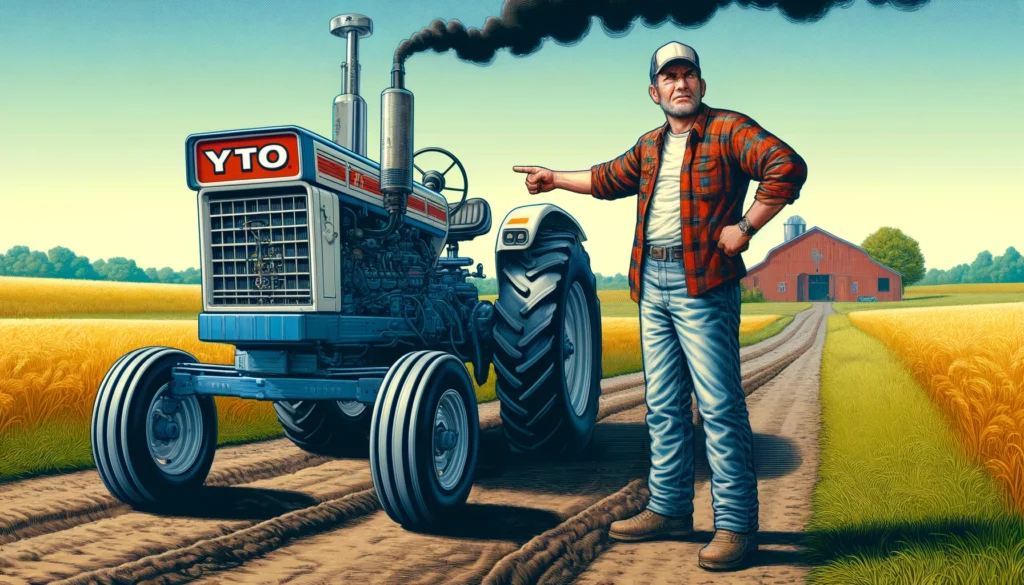
YTO tractor A vivid and detailed illustration of a frustrated farmer standing next to a YTO tractor in a farm setting. The tractor appears malfunctioning with vi 2.webp.webp
Conventional Farming
Definition:
Conventional farming refers to traditional agricultural production systems that rely on modern agricultural technologies, synthetic inputs, chemical pesticides, artificial fertilizers, genetically modified organisms (GMOs), mechanized equipment, and intensive management practices to maximize crop yields, optimize production efficiency, and meet commercial agricultural objectives. Conventional farming methods prioritize high-input, high-output agricultural systems that aim to increase productivity, profitability, and competitiveness in agricultural markets.
Description:
Conventional farming represents the dominant approach to agriculture in many parts of the world, characterized by large-scale monoculture cropping systems, industrialized farming operations, and standardized production practices. Conventional farmers use a combination of chemical inputs, synthetic fertilizers, pesticides, herbicides, and biotechnological innovations to control pests, manage weeds, enhance soil fertility, and improve crop performance, often relying on mechanized equipment, precision agriculture technologies, and genetic engineering techniques to optimize farm operations and achieve economies of scale.
Fall off the barn roof and busted your keister? Life on the farm or ranch can be tough on the bum. Need a break? Laugh it off at FarmerCowboy.com, the #1 farm humor site. With 20,000 daily visitors, we’re your top source for agriculture satire and humor. Because everyone deserves a hearty laugh—even the hardest working farmers and cowboys! Join us and turn those long days into fun tales at FarmerCowboy.com.
Key Characteristics of Conventional Farming:
Conventional farming is characterized by several key features and practices, including:
- Chemical Inputs: Reliance on synthetic chemicals, agrochemicals, fertilizers, pesticides, herbicides, fungicides, and plant growth regulators to control pests, manage diseases, suppress weeds, and enhance crop yields in agricultural production.
- Monoculture Cropping: Adoption of monoculture cropping systems, single-crop rotations, and intensive farming practices that focus on cultivating high-yielding crop varieties suited to specific climatic conditions, soil types, and market demands.
- Mechanized Operations: Utilization of mechanized equipment, farm machinery, tractors, combines, harvesters, tillage implements, and precision agriculture technologies to automate farm tasks, increase labor efficiency, and streamline production processes.
- Biotechnological Innovations: Integration of biotechnological innovations, genetic engineering, molecular breeding techniques, and biopharmaceutical applications to develop genetically modified crops, transgenic varieties, and bioengineered traits for improved agronomic traits, pest resistance, and crop performance.
- Industrial Scale: Operation of large-scale, industrialized farming enterprises, corporate agribusinesses, commercial farms, and vertically integrated food production systems that produce commodities for global markets, food processing industries, and consumer supply chains.
- Input Intensity: High-input agricultural systems that require significant amounts of external inputs, resources, energy, water, and capital investment to maintain intensive production practices, meet crop nutrient requirements, and sustain agricultural productivity over time.
- Economic Efficiency: Emphasis on economic efficiency, cost-effectiveness, and profit maximization in conventional farming operations through yield optimization, cost reduction, risk management, and market competitiveness strategies.
Criticisms of Conventional Farming:
Conventional farming practices have been criticized for several reasons, including:
- Environmental Degradation: Environmental impacts such as soil erosion, water pollution, habitat loss, biodiversity decline, and ecosystem degradation associated with intensive farming practices, chemical inputs, and monoculture cropping systems.
- Resource Depletion: Depletion of natural resources, soil fertility decline, nutrient depletion, groundwater depletion, and non-renewable resource consumption in conventional agriculture, leading to long-term environmental degradation and sustainability challenges.
- Chemical Residues: Concerns about pesticide residues, chemical contaminants, agricultural runoff, and food safety risks associated with synthetic chemical inputs, agrochemical residues, and pesticide exposure in conventional food production systems.
- Ecological Risks: Risks to ecological health, ecosystem services, wildlife populations, and pollinator populations from habitat destruction, pesticide toxicity, and agricultural intensification in conventional farming landscapes.
- Public Health: Potential human health risks, occupational hazards, and food safety concerns associated with pesticide exposure, chemical residues, antibiotic use, and genetic engineering technologies in conventional food production and processing.
Conclusion:
Conventional farming represents a widely practiced agricultural approach that emphasizes productivity, efficiency, and technological innovation in food production. While conventional farming methods have contributed to significant increases in agricultural productivity and food availability, they also pose environmental, social, and health challenges that require careful consideration and sustainable management approaches to address.
References:
- Pretty, J. (2008). Agricultural sustainability: Concepts, principles and evidence. Philosophical Transactions of the Royal Society B: Biological Sciences, 363(1491), 447-465.
- Tilman, D., et al. (2011). Global food demand and the sustainable intensification of agriculture. Proceedings of the National Academy of Sciences, 108(50), 20260-20264.
- Foley, J. A., et al. (2011). Solutions for a cultivated planet. Nature, 478(7369), 337-342.
Originally posted 2009-12-02 23:04:52.
Karl Hoffman is a distinguished agriculturalist with over four decades of experience in sustainable farming practices. He holds a Ph.D. in Agronomy from Cornell University and has made significant contributions as a professor at Iowa State University. Hoffman’s groundbreaking research on integrated pest management and soil health has revolutionized modern agriculture. As a respected farm journalist, his column “Field Notes with Karl Hoffman” and his blog “The Modern Farmer” provide insightful, practical advice to a global audience. Hoffman’s work with the USDA and the United Nations FAO has enhanced food security worldwide. His awards include the USDA’s Distinguished Service Award and the World Food Prize, reflecting his profound impact on agriculture and sustainability.



